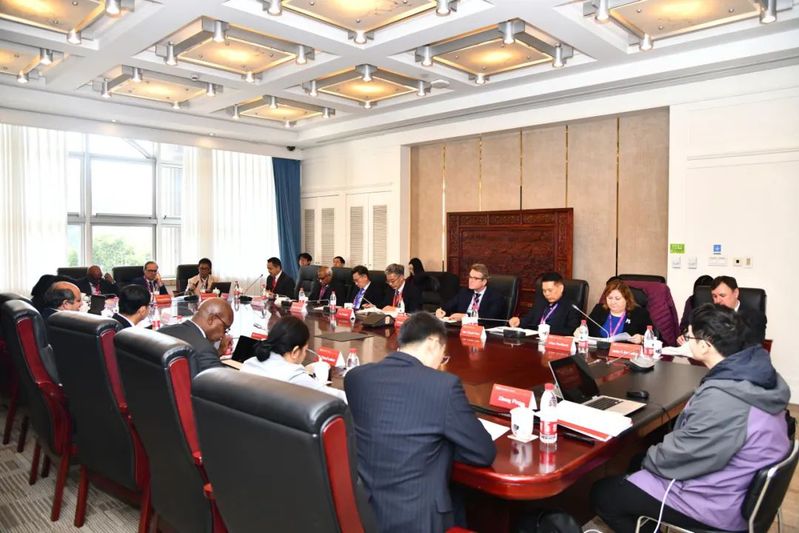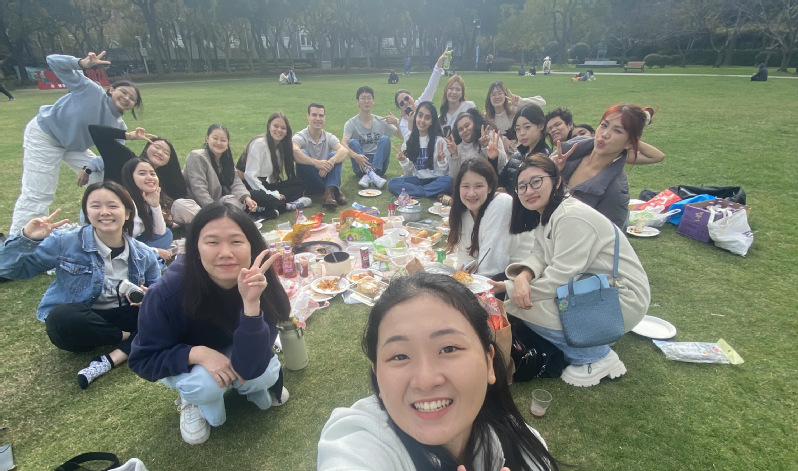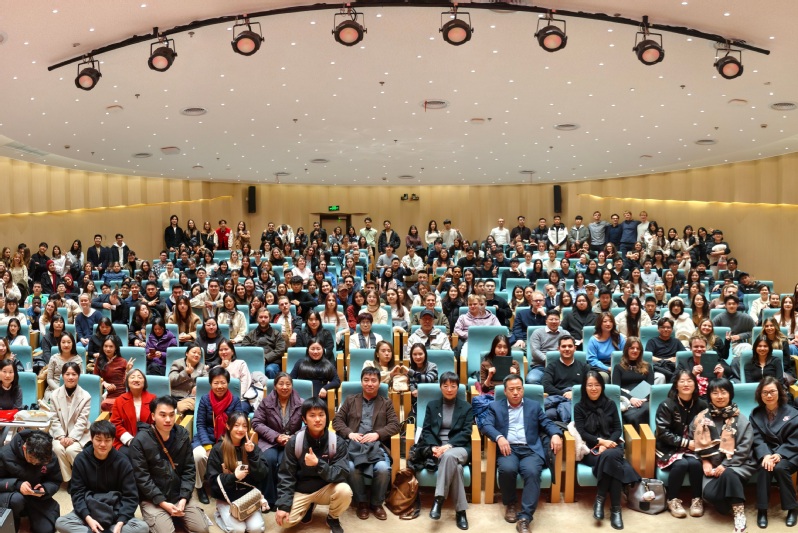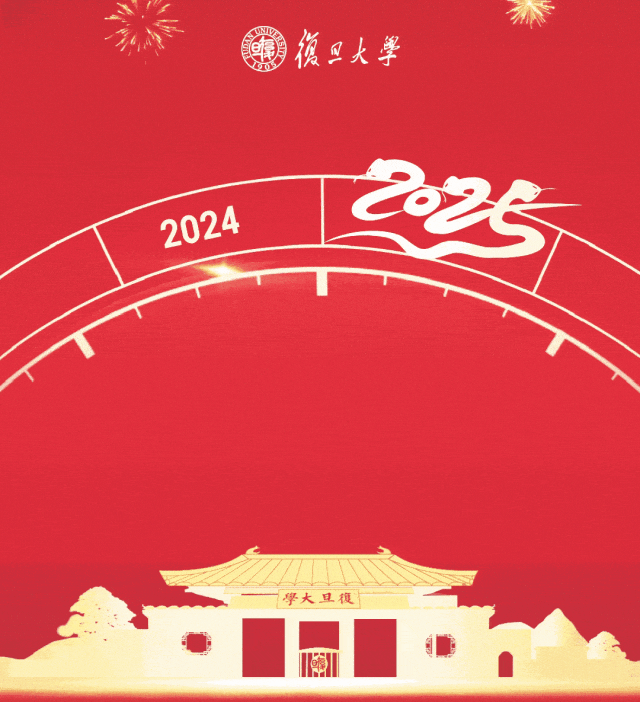The Fourth Dean’s Forum of the Union of Schools of Politics and International Relations (USPIR) was held at Fudan University on November 18, bringing together deans and department directors from universities in countries along the Belt and Road to discuss under the theme of “Global Governance and Order in the Political World”.

This forum, part of the 7th Belt and Road and Global Governance International Forum, was co-hosted by Fudan’s School of International Relations and Public Affairs (SIRPA) and Fudan Institute of Belt and Road & Global Governance (BRGG).



Professor Su Changhe, dean of SIRPA, delivered opening remarks. Professor Zheng Yu, director of Department of International Politics, SIRPA, and Professor Zhang Ping, assistant dean of SIRPA, moderated discussions where participants shared their perspectives on the development and challenges of global governance and global order.

The exchange of ideas at this forum underscored the evolving landscape of global governance and the diverse roles countries play in shaping a new global political and economic order.
Seeking common grounds to promote global governance

Pitchayaphant Charnbhumidol, vice principal of Thailand's Rangsit University, said that multilateral frameworks could be both competitive and collaborative. He advocated for collaborative strategies to address pivotal global and regional issues.

Javzandolgoryn Battogtokh, former dean of the School of International Relations and Public Administration at National University of Mongolia, emphasized the need for closer ties and joint responses to common challenges.

Thida Aung, director of the Department of International Relations at University of Yangon of Myanmar, elaborated the political divides between the Global South and North, urging for win-win cooperation. She underscored the importance of seeking common grounds and striving for global prosperity.

Nguyen Thi Minh Tien, dean of the Faculty of International Studies at Hanoi University, highlighted efficient local governance, stating that participation in major global mechanisms remains an inalienable approach towards addressing global challenges.

Bui Thanh Nam, director of Academic Affairs at Vietnam University of Social Sciences and Humanities, discussed the inadequacy of previous global governance mechanisms in today’s world. He reviewed the lack of mutual trust between developed and developing countries, stressing the need for further cooperation.
Building new order in promoting reform

Zafar Nawaz Jaspal, dean of the School of Politics and International Relations at Quaid-i-Azam University in Pakistan, discussed the prioritization of geostrategic concerns over geoeconomic ones. He expressed his worries over the world’s tendency to a more radical diplomatic approach.

Irina Novikova, dean of the School of International Relations at Saint Petersburg University in Russia, expressed support for promoting the development of the Global South through the BRICS model. BRICS cooperation has played a positive role in solving problems faced by developing countries in global governance.

Dmitry N. Baryshnikov, vice dean of the School of International Relations at Saint Petersburg University, noted that while existing global governance mechanisms differ, most are aimed at addressing post-Cold War global issues. It is necessary to seek further reforms for these mechanisms to better achieve global governance.

Cleland Leshore, a former Kenyan diplomat to South Sudan and lecturer of the Department of Diplomacy and International Studies at the University of Nairobi in Kenya, elucidated the importance of establishing a global order and a governance framework that embrace new opportunities and overcome obstacles.

Sebastian Bersick, vice dean of the Faculty of East Asian Studies of International Political Economy of East Asia at Ruhr-Universität Bochum, said that countries should form connectivity in the economic, political, and security dimensions to avoid such negative impacts as the Cold War on the global economy and development.
Exploring developing patterns for the future of Global South

Rath Sethik, dean of the Faculty of Development Studies at the Royal University of Phnom Penh in Cambodi, believed that global governance is the coordination of rights, providing public goods at the global level, and addressing common challenges. BRI has played a significant role in promoting infrastructure development in Cambodia.

Semiarto Aji Purwanto, dean of the Faculty of Social and Political Sciences at University of Indonesia, said that Southeast Asia is in a transitional period. It is necessary to fully exploit the potential of the Greater Bay Area and BRI to promote regional prosperity and foster a cooperative and inclusive attitude.

Degefa Tolossa, former dean of the College of Development studies at Addis Ababa University, pointed out that Ethiopia should strive to transform its economy from agriculture-driven to industry-driven, in which regard, Ethiopia can learn greatly from China.

Riccardo Pelizzo, vice dean of the Graduate School of Public Policy at Nazarbayev University in Kazakhstan, believed that economic growth disparities between the Global South and North lead to conflicts between the two. China’s governance model is of reference value to developing countries.

Srikanth Kondapalli, dean of the Faculty of Social and Political Sciences at University of Indonesia, noted that the Western perspective on the Global South is flawed. It is necessary to consider the concerns of countries regarding sovereignty and the environment, and to broadly consider the stance of the Global South related to BRI.

Chandra Lal Pandey, head of the Department of Development Studies at Kathmandu University in Nepal, thought that BRI represents a new type of global governance framework, playing a positive role in policy coordination, connectivity, trade and economic exchanges, and cultural exchanges.

The forum concluded with a summary speech by Professor Su Changhe, who also reported on the future work of the USPIR.
(END)
Presented by Fudan University Media Center
Writer: Chen Shuyang
Editor: Wang Mengqi, Li Yijie
Designer: Ling Yiqi




